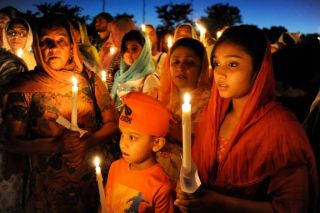Bias
Sikh Temple Shooting and the Trouble With Looking Muslim
Post-9/11 Islamophobic sentiment touched many groups, including Sikhs
Posted August 7, 2012

MARK WELSH / DAILY HERALD / AP
This last week marked the annual American Psychological Association convention, where thousands of psychologists and mental health professionals converged in Orlando, Florida to present studies, exchange ideas, and better understand the psychological underpinnings of human thoughts, behaviors, and actions.
On the plane into Florida, I sat next to a woman flying in from Holland, hoping to learn more about multicultural aspects of creativity and business consulting for the classes she taught. We spoke about our backgrounds and training, and the conversation shifted into my presentation for the conference. I explained my work on understanding Islamophobia and identity development in young Muslims. I’ve discussed the concept of Islamophobia previously here, and the findings of my own study here. I also talked to the woman about standing up for a television show aimed at humanizing Muslims in America, and the cognitive errors which promulgate racism. A related article about this can be found here. I talked about the barrage of page long hate e-mails I received as a result of this work. But most of all, I discussed the tragic misunderstanding of ethnic and religious groups, and how hatred, discrimination, and racism is not the problem of just one group.
Many times in multicultural conversations, individuals may believe us to live in a post-racial society and not grasp why these conversations continue and are essential. They may wonder, why bother studying one tiny ethnic group when they may appear to be a mere drop in an ocean of cultures? The reality has been posed by many multicultural scholars who explain the trouble with being brown.
When 9/11 occurred, anyone who could pass as Muslim was targeted. In the nine weeks following September 11th, the Arab Anti-Discrimination Committee confirmed over 700 violent acts against Arabs and on those perceived to be Arab (Kaplan, 2006), while the FBI reported a 1600% increase in hate crimes against this group in the year following 9/11. The operative term here is those “perceived to be Arab.” Prior to the recent shooting in Wisconsin, Sikhs have been regular targets of hate crime and discrimination since 9/11 occurred. Researchers have suggested that 9/11 did not mark a sudden hatred against Muslim groups, and those seeming to be Muslim. Rather, there was pre-existing anti-Islamic and discriminatory sentiment that intensified over time (Allen & Nielsen, 2002; Sheridan, 2006).
As such, a problem for Muslims is really not just about Muslims. It affects the Christian Arabs, the Sikhs, and anyone appearing to be Muslim. It is a truly sad state of affairs though that to better understand the far-reaching affects of Islamophobia, it has to touch non-Muslims as well. Nevermind the mosques with bullet holes, the Korans being burned, or the women whose hijabs are pulled off of their heads. According to one statistic, Americans believe Muslims to experience the most prejudice of any group. But we have done little to address this. Furthermore, Americans would give the nation a “C” or below grade in addressing racial tensions. For more on theses statistics, see a previous article I wrote about the Characters Unite project here.
In the end, my heart goes out to all the families and communities whose lives have been affected by the recent tragedy. They are added in my mind to the tally of thousands of victims of needless violence and ignorant hatred. How many more will be hurt before we stand up as a nation to stop this? It is my continued hope that we learn to open our eyes and minds to the truth that we are all put on this earth as equals in character and value, with our actions ultimately determining who we become and what lives we live. May we choose the life of acceptance and peace.
Follow me on Twitter at MillenialMedia
*Please note comments that are offensive, discriminatory, racist, or otherwise inappropriate will be automatically removed by the author’s discretion.


